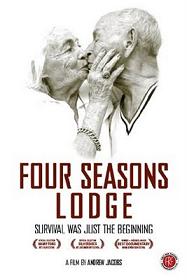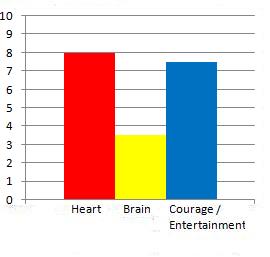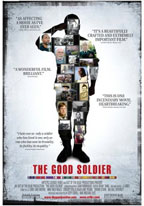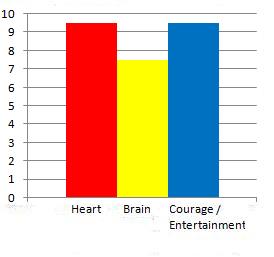Reviews for November 11th, 2009
Four Seasons Lodge
Directed by Andrew Jacobs.

This heartfelt, marginally fascinating documentary focuses on Four Seasons Lodge, a bungalow colony in the Catskill Mountains of New York where a group of Holocaust survivors have been spending their summers at for the past 25 years. They dance, eat and play games such as poker together while socializing with one another. Neither of them brings up the details or discusses their painful memories of the Holocaust. Two of the groupís members, Carl Potok and Hymie Abramowitz, run the lodge as president and vice president, respectively. Thereís also Tosha, Hymieís wife, as well as Tobias Buchman and Lola Wenglin, two survivors who met at a concentration camp during the Holocaust and have fell in love with each other years later. Olga Bowman and Eugenia ďGenyaĒ Boyman have remained friends for the past 65 years and stay sleep in the same room together at the lodge. Director Andrew Jacobs does an outstanding job of capturing the lodgersí idiosyncratic personalities that gradually emerge by documenting their interactions and small talk on camera. Itís somewhat interesting and inspiring to observe their behavior during the small moments, for instance, when they find ways to bring out humor throughout the serious situations, sometimes through sarcasm. The footage of them crying, getting misty-eyed or slightly defensive when it comes to speaking about their Holocaust experiences balances those happier moments with a sense of poignancy. However, Jacobs gets a little too carried away with showing them going about their daily routines at the lodge without actually slowing down a bit to get to know them or at least to provide audiences with background information about them. A documentary can sometimes get away with merely tugging at your heartstrings or other means of playing with your emotions instead of provoking you intellectually, but that depends on the topic at hand. When the lodgers briefly get serious outside of their small talk, they make oversimplified statements that could use some delicate inquiry. Jacobs could have added much more insight had he sat down with at least one of them for an interview that digs deeper into their thoughts and feelings, especially given itís their last summer at the lodge before it permanently shut down after all of those years of being a ďparadise in the mountains.Ē At a running time of 1 hour and 37 minutes, Four Seasons Lodge manages to be a tender, heartfelt documentary thatís ultimately underwhelming and incomplete because it fails to pack a much-needed intellectual punch.
Number of times I checked my watch: 3 Released by First Run Features. Opens at the IFC Center. 
The Good Soldier
Directed by Lexy Lovell and Michael Uys.

This provocative and timely documentary follows five war veterans as they discuss how their experiences during the war shaped their perspectives on what it means to be a good soldier. Staff Sergeant Jimmy Massey served in the Marine Corps as a recruiter before being sent to Iraq where he killed innocent civilians in 2003. He candidly gives an account of how he suffered from a mental breakdown and crisis of conscience during the Iraq War. He recalls telling his Commanding Officer that killing those innocent civilians made it a bad day for him, but the Officer replied that that, in his view, itís actually a good day. He felt betrayed by the Marine Corps since that very day and has protested the war here in the United States while founding the group Iraq Veterans Against the War. Chief Warrant Officer Perry Parks served in the Vietnam War where he flew 3,000 hours of combat missions also killing innocent civilians. Captain Michael McPhearsen served in the first Gulf War and, since then, no views the military in such an ideal, positive light that he had viewed it before his experiences in the war. Private Edward Wood served in World War II for a few days before getting wounded during combat. Itís fascinating to listen to him talk about the challenges and horrors of being sent to France as a replacement soldier. Finally, Staff Sergeant Will Williams, a veteran of the Vietnam War, has been suffering from Post Traumatic Stress Disorder since the war. He vividly recalls the gruesome details about how he had to carry a dead soldier whose brains spilled out. Essentially, he became a killing machine that didnít even have any remorse during that time. As one of the veterans wisely states, itís very easy to turn on the kill switch, so-to-speak, in your mind, but itís a very challenging task to turn it off once youíre back at home from the war. Co-directors Lexy Lovell and Michael Uys wisely let the five veterans just speak their minds about the war without cutting any corners or using any euphemisms. It would have been interesting, though, had the co-directors went even further to ask the veterans why they think it took so long for the American public to oppose the war in Iraq. How do they define and describe patriotism at its core? Nonetheless, the question about what it means to be a good soldier is quite an intriguing and intellectual one that allows the veterans to really open up emotionally in front of the camera. In many ways, their confessions represent a form of catharsis for them because they get to channel their pain, suffering, anger and frustrations through words. At a running time of 1 hour and 19 minutes, The Good Soldier manages to be a provocative, vital, honest and profoundly moving documentary. It would make a great companion piece to an equally powerful narrative film, The Messenger, out in theaters now as well. Number of times I checked my watch: 1 Released by Artistic License. Opens at the Village East Cinema. 
Main Page
Alphabetical Menu
Chronological Menu
______________________________________________________
|




